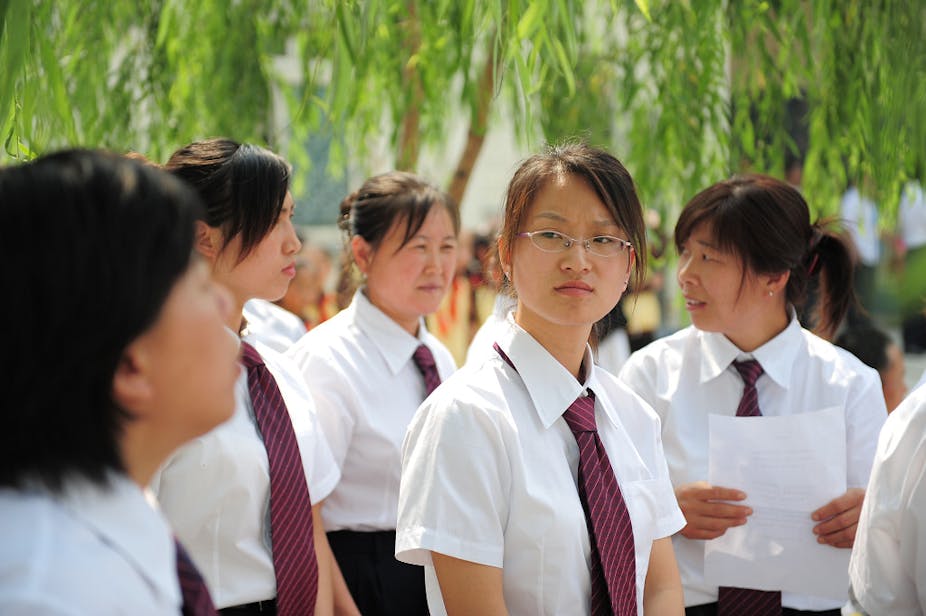Chinese pupils are once again at the top of international education rankings. Recent further in-depth analysis of results from the 2012 Programme for International Student Assessment (PISA) tests, have now shown that it’s not just pupils from Shanghai and Beijing coming top of the class. Children from rural areas and disadvantaged environments of China also outperformed peers in other countries.
UK education secretary Liz Truss is leading a visit to China with a group of teachers to observe why. But she should be mindful of copying a system that is being questioned by some Chinese researchers for the stress it puts on children.
Chinese pupils spend more time in school than British children. School days are longer and holidays are shorter. On average, under the current system the length of the secondary school year is 245 days. Chinese pupils get around four weeks off in winter, and seven weeks in summer, including weekends and all kinds of traditional festivals. That’s a total of 175 days off, 37 days fewer than UK pupils.
Primary school starts at age six for pupils in China. In the country’s mega-cities, like Beijing and Shanghai, pupils go to school from 8am to 3pm with an hour and a half for lunch. But in most areas around the country, there’s a break from school for lunch and, often, a lunch-time nap at home.
In secondary school, the competitive pressure mounts to get into top high schools, considered as stepping stones to the famous universities. Even at this stage, parents start investing money in math Olympiads or English classes in cram schools for children whose test-scores might make them borderline candidates for acceptance at these sought-after high schools.
The workload ratchets up. Pupils spend from 7:30am to 8am at school reading, either in English or Chinese. School ends at 4pm, but most secondary school pupils in mega-cities then rush into tutorial classes to cram for important exams.
More than 45% of pupils spend up to four hours a week in after-school lessons in mathematics. An additional 20% more pupils in Shanghai spend more than four hours a week on maths, English and Chinese classes. Usually, this is not the end of the learning day. Once pupils come back from their tutorial, they have to complete their homework before going to bed. According to a recent survey, pupils in cities are facing problems of sleep deprivation.
Compared with their counterparts in mega-cities, pupils of secondary schools in secondary cities and rural areas who attend public boarding schools far from their hometowns, also have to spend at least four hours learning on top of the school day. Their learning time begins at 6pm. Pupils stay at their own classroom for “evening sessions,” which function like study halls or tutoring periods. They do homework and study, while teachers assist them. After dinner, evening sessions conclude at 10:30pm.
A recent study by the OECD shows that on average, pupils in Shanghai aged 12-14 spend 9.8 hours on learning in the classroom, and 3 hours finishing their homework each day, averaging 13.8 hours per week. This is far more than the OECD average of 1.2 hours per day. More than 65% of pupils get up between 6am to 6:30am and go to bed between 10pm to 11:30pm.
But the key question being asked by many in the UK and elsewhere is whether more learning time at school translate into better pupil attainment. In my view, the answer is no. Simply increasing the number of teaching hours, shortening the school holidays, and copying East Asian educational experiences cannot improve pupil performance. After all, there are tremendous differences between the education systems, social features and historical background of UK and China. The East Asian educational experience comes as a package, so increasing pupil’s learning time has questionable merit just on its own.
One of the important elements of Chinese school is teachers’ instruction in and after class. There has been a lot of effort to improve Chinese teaching, through teacher professional development, teacher collaboration, or school leadership.
High expectations
Education has always been considered the most important path to success in Chinese culture. Parents recognise achievements in core subjects, which include maths, Chinese and English at secondary school level, are vital for success in the new society. They strongly encourage their children and have high expectations of them to fulfil their own dreams.
Studies have shown Chinese parental influence encompasses two important aspects. Part is the direct involvement of parents with homework and difficult problems, and part is these parents’ attitudes to learning. Familial expectations are the main motivating factors for Chinese pupils. Combined with high-stakes exams at various points in the educational system, this means that pupils are pushed by these external motivations.
Researchers in the UK and China overestimate the advantages of a longer school day. Chinese pupils have sound basic skills, but lack some of the creativity of English students. Recently, criticisms of this have been made by observers of the Chinese school system.
But UK educators envy Chinese pupils’ outstanding performances in the PISA rankings. Some commentators point out that even though Chinese pupils do well in PISA, they are not being taught to compete in an innovation economy. They argue that the current school curriculum and teaching methods are robbing pupils of their curiosity, creativity, and childhood. We must be realistic in our self-estimation, neither being conceited nor belittling ourselves.

